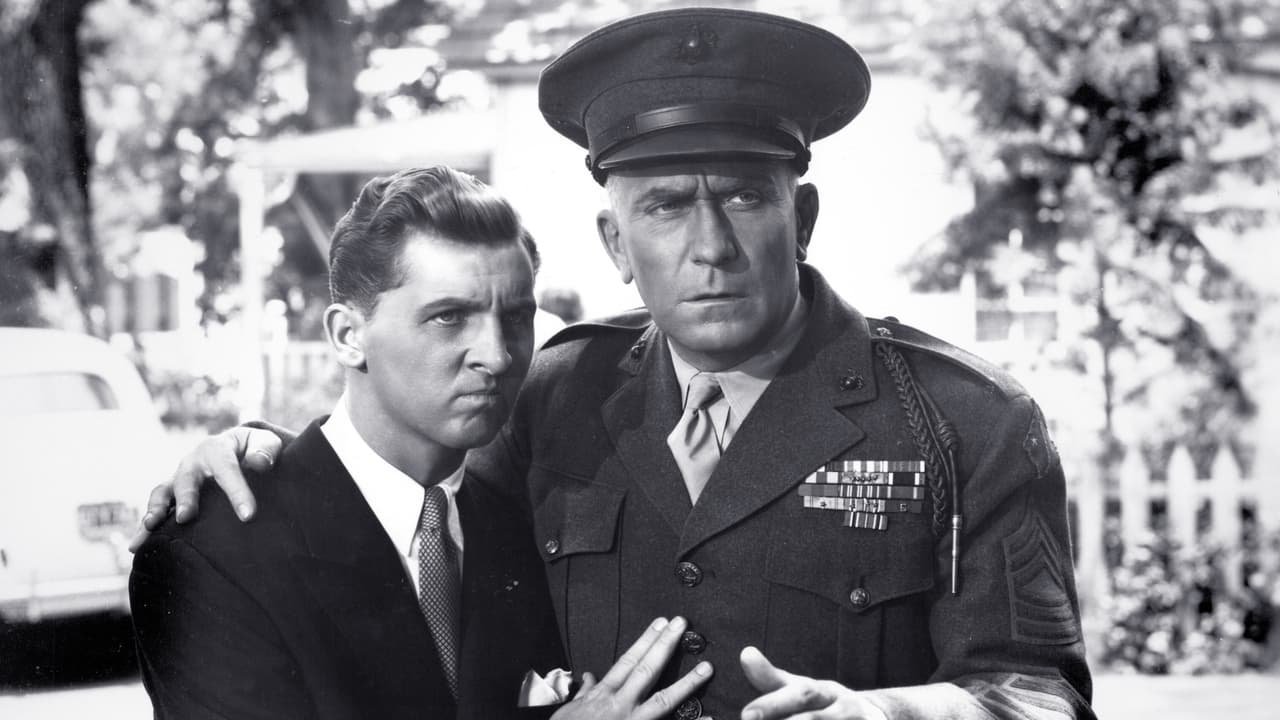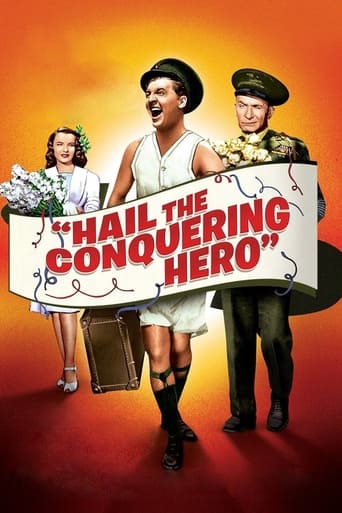

In a way, Preston Sturges script is the reverse of The Best Years of Our Lives, only this might just be the film that laid the groundwork for that classic. While this is done as a comedy all the way, it's script touches the soul of wartime America. Everyone was so committed to the war effort, this one goes over board in showing how the home front honors hero's, even though Woodrow(Eddie Bracken) is no hero. This film is a lot of the casts finest hours on film. Bracken is brilliant in a role which he is not real comfortable in, but does play it so well.Ella Raines, though in the background for a fair portion of this one, really shines as Libby, Woodrows childhood love. To me, William Demarest (Sgt. Heffelfinger) is at his absolute best in this movie and nearly steals the show. The Sgt. is the key character in this movie.It is the Sgt. that arranges to get Woodrow, reluctantly, to go home after being rousted out of the Marines on a minor problem ( chronic hay fever) that is why he is not going home. Woodrow is no hero, and working in a factory and drinking at a bar, he buys 6 real Marines (including Sgt.) a round of beer as the real ones have no money. In return, they come up to the bar to thank him, and learn his story. This is the perfect hook for the story to hang on. The comedies have a strong story, and this one is among the best.With all the unaccredited players and folks from silent films in this, you'd think there would be too much physical slapstick. This Sturges script is too good for that. In fact, after being a farce for quite a while when Woodrow gets back home, this movie suddenly becomes an almost dramatic film. This is a credit to Sturges directing his own script as his direction is the only man who could take an out of control farce and put it back on track.Comedy and Drama have rarely been mixed better than this film. As the World War 2 generation is fast departing us now, this movie should be a double feature film with The Best Years Of Our Lives. It would be a long double bill, but the contrast between these 2 differently brilliant films would give everybody an idea of the greatest generation. I am so glad I have finally seen this gem.
... View MoreThis has always been always been one of my favourite films and with its central theme of undeserved celebrity, seems even more relevant in today's world of reality TV stars and overnight fame. The difference here is that the object of everyone's affection, the hapless Woodrow Truesmith (there's irony in his name) doesn't want the spotlight accidentally diverted onto him by the six penniless but well-meaning serving fellow-marines for whom he buys a drink in a bar. Although signed up for service in the marines himself, Truesmith has been medically discharged for a year because of chronic hay fever and to finally return home, has at last got up the courage to admit it to his adored mother, herself the widow of a marine hero, Truesmith's dad of course. Not wishing to have him hurt his mum's feelings, the marines phone ahead, fabricating Woodrow's background story of heroism, which promptly catches fire in his native town and sees him lauded to the skies on arrival in his hometown. Reluctant to play along right from the start, things quickly snowball out of control for Woodrow as the town promptly fawns over him, pays off his mum's mortgage and even puts him up for mayor against the long-standing, self-important and bumptious Everett Noble, but even when Truesmith's secret inevitably comes out there are still a few surprises in store before the end.There's no great secret behind the wonderful series of films Preston Sturges produced in the early to mid 40's, it's all there in the writing. The dialogue is crisp, funny and pithy, the sharp exchanges between characters requiring expert timing and intelligent direction. It gets both and then some, the cast young and old, getting nary a line to waste and never wasting a word. With the machine-gun delivery, any slackers would be found out and there just aren't any. By the time we get to the surprise ending when Truesmith's native honesty and humility change the expected run of events, there's still time for Sturges to insert some front-line truth, one of the marines telling Woodrow that he's lucky to only have the one battlefield nightmare compared to the many who have them constantly and even finish with a war-time rallying point as the marines finally leave town to return to duty, their well-meant meddling all repaired at last.None of the stars Sturges employs are household-name, but by dint of many of them forming part of his regular troupe, their interplay is a delight to watch, as is the director's skill with crowd-scenes. Eddie Bracken with his expressive face and honest disposition is great as the accidental hero, Truesmith while Ella Gaines also does well as his love interest, while the interplay between the blowhard elder Noble and his slow-witted, drone-voiced son is hilarious. That said, there's no face out of place here, everyone acts with such naturalness, quirks and all, that like with Capra, you're convinced you're the extra visitor in a real-life town.Sturges was considered the "wunderkind" of Hollywood around this time and this sparkling satire shows him at his considerable best.
... View MoreIt is the middle of World War II and American towns are gripped by patriotic fervor. In Preston Sturgis's "The Miracle of Morgan's Creek," which appeared the same year as this, Betty Hutton was what was called "a Victory girl" who gave a departing serviceman a good-bye present that left unanticipated consequences. In Sturgis's "Hail the Conquering Hero," small-town nobody Eddie Bracken is quickly discharged from the U. S. Marine Corps because he has hay fever. Ashamed to go home, he gets a job in the city and writes letter to his Mom bragging about the battles he's been in. After all, Mom has already lost family members in combat and doesn't need a disappointment.Finally he decides to visit home. He buys a uniform and campaign ribbons to make his epistolary lies more believable. But on the train he runs into half a dozen tough Marines who have been on Guadalcanal. They're led by William Demarest. Taking pity of Bracken's mother, they get him in shape and escort him to his house.He's unexpectedly welcomed as a brave warrior. Bands play, crowds cheer, his beautiful girl friend (Ella Raines) begins to glow with a renewed admiration. His mother sobs with relief and pride. The townsmen plan to put up a statue. A parade marches down the street.Bracken is overwhelmed, having thought he'd slip in and out, but his Marine buddies prop him up and tell Homeric tales of his bravery. The town pays off his mother's mortgage and supports him for Mayor against a hilarious and corrupt blow hard. Some of the funniest moments involve Al Bridge trying to make a public statement or dictate a letter and being constantly interrupted.Frank Capra made a number of movies in a similar vein -- the gullibility of the public when faced with a phony or with big-time crookedness -- but there was always a sentimental climax in which honesty was finally rewarded. Honesty is rewarded here, too, but in a rough-house, grab-ass, ironic way. Nobody will weep when Woodrow Lafayette Pershing Truesmith makes his confession.Eddie Bracken is good at this sort of thing -- stuttering, shaking with fear, being shoved around by a horde of admirers, tearing his hair out with shame. Ella Raines is so conventionally beautiful that she's reason enough to stay home. The Marines are up to snuff. In fact, one of the more moving moments is when Bracken has developed a scheme to wiggle out of town and desert his adoring mother. One of the men loses his temper, Bracken hysterically socks him, and the Marine wipes his mouth and says contemptuously, "Go hurt a girl. That's all you're good for." The fact that the Marine can't act makes the scene more touching.The director came and went through Hollywood like a rocket. His career last for some years but he never equaled his output over a brief period in the early forties. Too bad. This is pretty good.
... View More...and this is easily among his finest (and funniest) of his earthly works. Eddie Bracken manages to be hilarious and heartbreakingly lovable -- just as he was in "Miracle of Morgan's Creek." The entire ensemble of Sturges stalwarts -- people like the immortal Raymond Walburn and William Demarest -- are at the absolute top of their game.With crackling dialogue, finely drawn characters and a pell-mell plot, "Hail the Conquering Hero" is proof positive that comedy can be great art. More than six decades after it was made, it feels funnier and fresher than any comedy you're likely to see today. This comedy is an unstoppable snowball, gaining size and momentum as it barrels down a mountainside. See it, and then seek out Sturges's other masterworks.
... View More